ENEV 223 - Fall 2016: Sustainability Efforts at University of Regina
VerifiedAdded on 2019/10/18
|6
|1205
|172
Report
AI Summary
This report analyzes the sustainability efforts undertaken by the University of Regina, focusing on initiatives within the engineering, environment, and society departments. The university has adopted a five-year strategy to address environmental issues related to air, water, and soil, aiming to become more user-friendly. Key findings include the installation of water stations, wastewater reclamation, and new composting services. The university's approach encompasses waste reduction, transportation, energy conservation, leadership, and community engagement, with a strong emphasis on social justice and well-being. The report highlights waste minimization programs, recycling initiatives, and the implementation of an energy dashboard. Recommendations emphasize reducing the carbon footprint through sustainable transportation and efficient infrastructure. The University of Regina aims to be a leader in sustainability, constantly reviewing and improving its strategies to create a greener and more sustainable environment. The report also references the ecological footprint of Regina and concludes with a call to action for other universities to learn from the U of R's example.
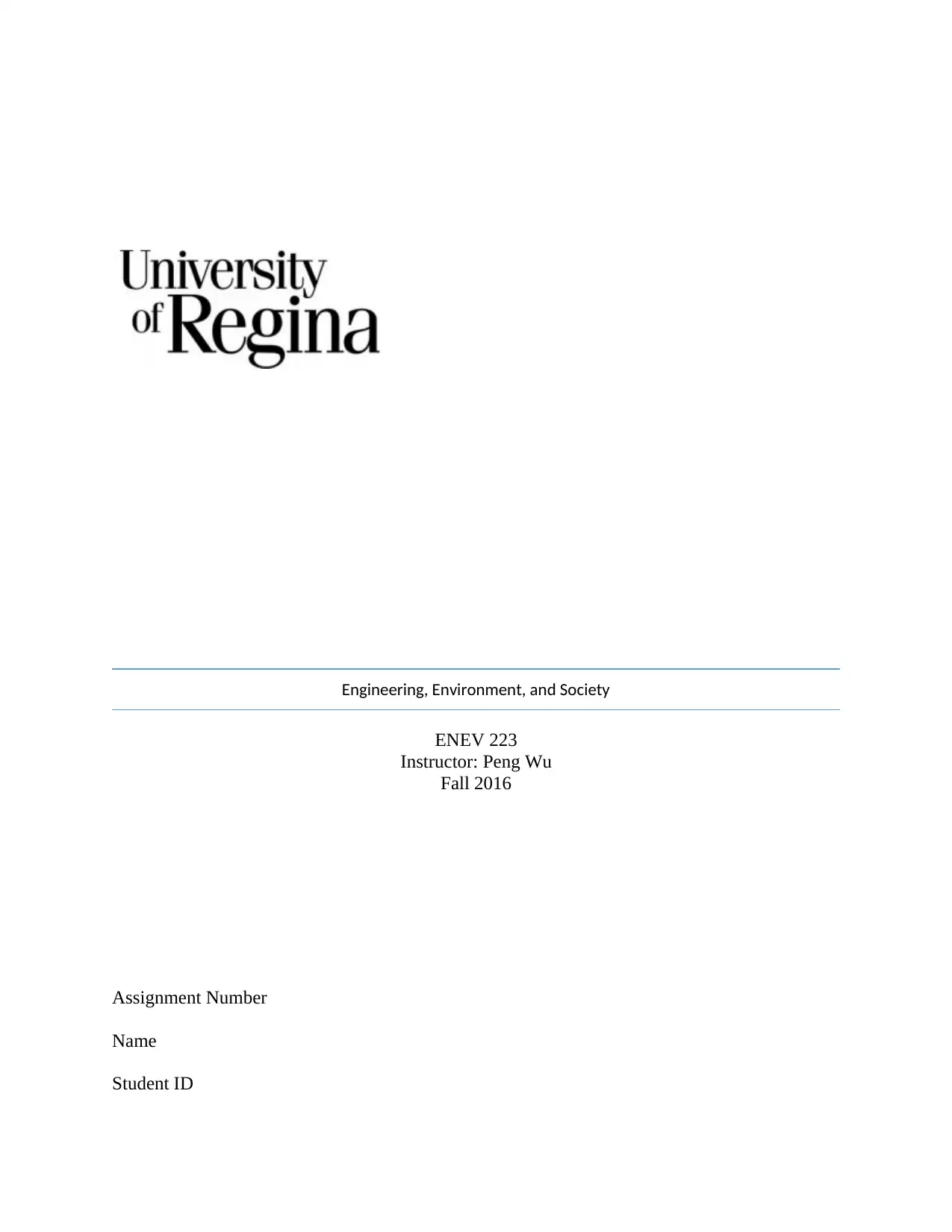
Engineering, Environment, and Society
ENEV 223
Instructor: Peng Wu
Fall 2016
Assignment Number
Name
Student ID
ENEV 223
Instructor: Peng Wu
Fall 2016
Assignment Number
Name
Student ID
Paraphrase This Document
Need a fresh take? Get an instant paraphrase of this document with our AI Paraphraser
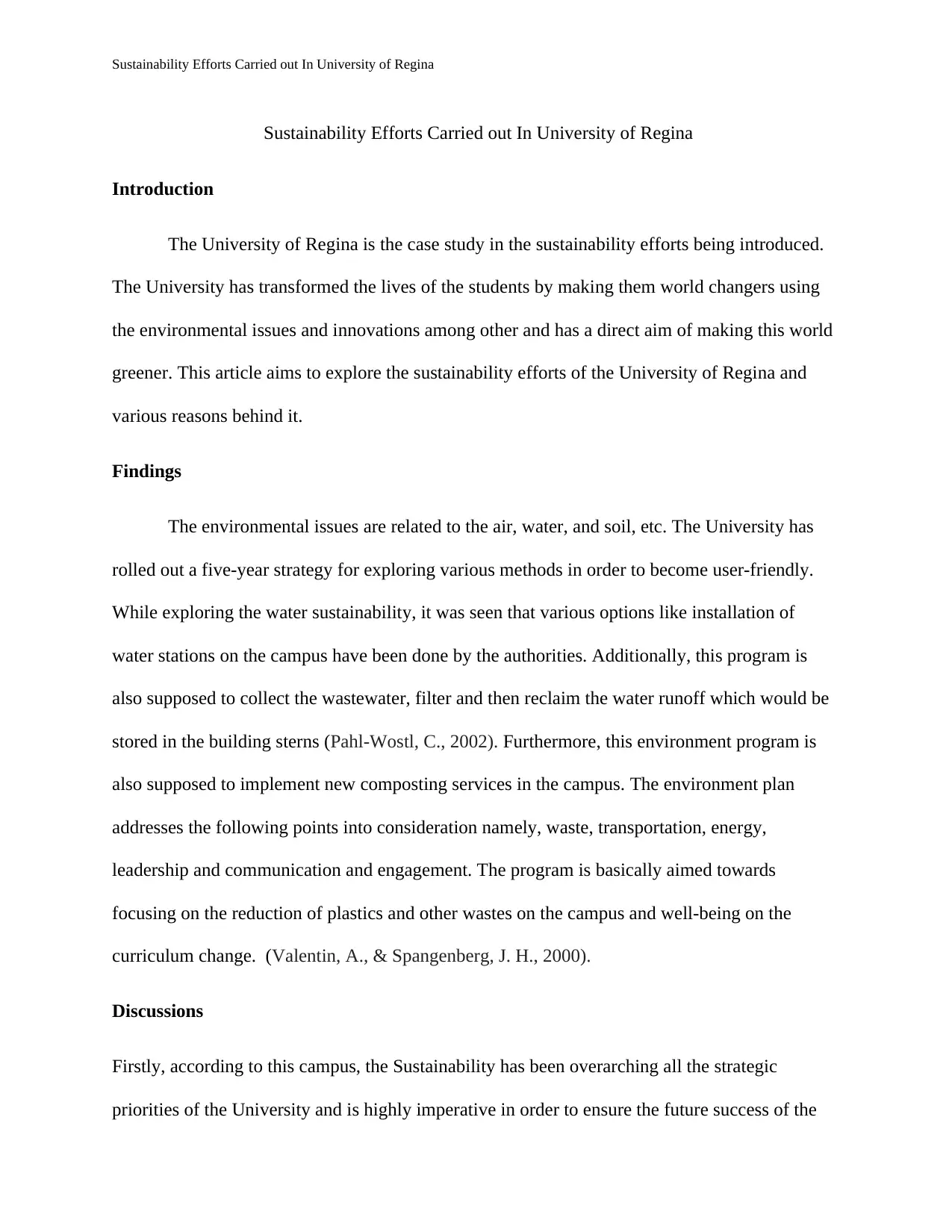
Sustainability Efforts Carried out In University of Regina
Sustainability Efforts Carried out In University of Regina
Introduction
The University of Regina is the case study in the sustainability efforts being introduced.
The University has transformed the lives of the students by making them world changers using
the environmental issues and innovations among other and has a direct aim of making this world
greener. This article aims to explore the sustainability efforts of the University of Regina and
various reasons behind it.
Findings
The environmental issues are related to the air, water, and soil, etc. The University has
rolled out a five-year strategy for exploring various methods in order to become user-friendly.
While exploring the water sustainability, it was seen that various options like installation of
water stations on the campus have been done by the authorities. Additionally, this program is
also supposed to collect the wastewater, filter and then reclaim the water runoff which would be
stored in the building sterns (Pahl-Wostl, C., 2002). Furthermore, this environment program is
also supposed to implement new composting services in the campus. The environment plan
addresses the following points into consideration namely, waste, transportation, energy,
leadership and communication and engagement. The program is basically aimed towards
focusing on the reduction of plastics and other wastes on the campus and well-being on the
curriculum change. (Valentin, A., & Spangenberg, J. H., 2000).
Discussions
Firstly, according to this campus, the Sustainability has been overarching all the strategic
priorities of the University and is highly imperative in order to ensure the future success of the
Sustainability Efforts Carried out In University of Regina
Introduction
The University of Regina is the case study in the sustainability efforts being introduced.
The University has transformed the lives of the students by making them world changers using
the environmental issues and innovations among other and has a direct aim of making this world
greener. This article aims to explore the sustainability efforts of the University of Regina and
various reasons behind it.
Findings
The environmental issues are related to the air, water, and soil, etc. The University has
rolled out a five-year strategy for exploring various methods in order to become user-friendly.
While exploring the water sustainability, it was seen that various options like installation of
water stations on the campus have been done by the authorities. Additionally, this program is
also supposed to collect the wastewater, filter and then reclaim the water runoff which would be
stored in the building sterns (Pahl-Wostl, C., 2002). Furthermore, this environment program is
also supposed to implement new composting services in the campus. The environment plan
addresses the following points into consideration namely, waste, transportation, energy,
leadership and communication and engagement. The program is basically aimed towards
focusing on the reduction of plastics and other wastes on the campus and well-being on the
curriculum change. (Valentin, A., & Spangenberg, J. H., 2000).
Discussions
Firstly, according to this campus, the Sustainability has been overarching all the strategic
priorities of the University and is highly imperative in order to ensure the future success of the
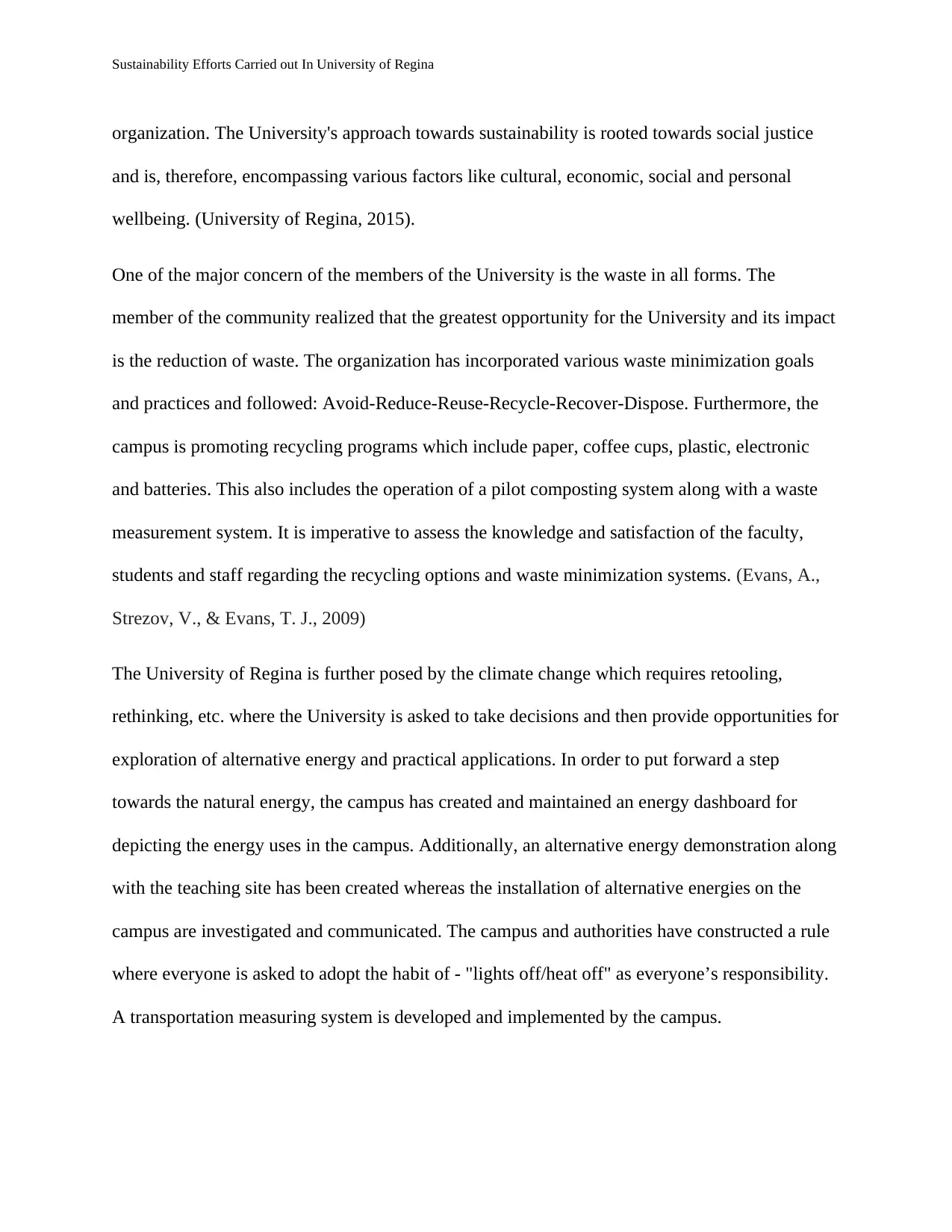
Sustainability Efforts Carried out In University of Regina
organization. The University's approach towards sustainability is rooted towards social justice
and is, therefore, encompassing various factors like cultural, economic, social and personal
wellbeing. (University of Regina, 2015).
One of the major concern of the members of the University is the waste in all forms. The
member of the community realized that the greatest opportunity for the University and its impact
is the reduction of waste. The organization has incorporated various waste minimization goals
and practices and followed: Avoid-Reduce-Reuse-Recycle-Recover-Dispose. Furthermore, the
campus is promoting recycling programs which include paper, coffee cups, plastic, electronic
and batteries. This also includes the operation of a pilot composting system along with a waste
measurement system. It is imperative to assess the knowledge and satisfaction of the faculty,
students and staff regarding the recycling options and waste minimization systems. (Evans, A.,
Strezov, V., & Evans, T. J., 2009)
The University of Regina is further posed by the climate change which requires retooling,
rethinking, etc. where the University is asked to take decisions and then provide opportunities for
exploration of alternative energy and practical applications. In order to put forward a step
towards the natural energy, the campus has created and maintained an energy dashboard for
depicting the energy uses in the campus. Additionally, an alternative energy demonstration along
with the teaching site has been created whereas the installation of alternative energies on the
campus are investigated and communicated. The campus and authorities have constructed a rule
where everyone is asked to adopt the habit of - "lights off/heat off" as everyone’s responsibility.
A transportation measuring system is developed and implemented by the campus.
organization. The University's approach towards sustainability is rooted towards social justice
and is, therefore, encompassing various factors like cultural, economic, social and personal
wellbeing. (University of Regina, 2015).
One of the major concern of the members of the University is the waste in all forms. The
member of the community realized that the greatest opportunity for the University and its impact
is the reduction of waste. The organization has incorporated various waste minimization goals
and practices and followed: Avoid-Reduce-Reuse-Recycle-Recover-Dispose. Furthermore, the
campus is promoting recycling programs which include paper, coffee cups, plastic, electronic
and batteries. This also includes the operation of a pilot composting system along with a waste
measurement system. It is imperative to assess the knowledge and satisfaction of the faculty,
students and staff regarding the recycling options and waste minimization systems. (Evans, A.,
Strezov, V., & Evans, T. J., 2009)
The University of Regina is further posed by the climate change which requires retooling,
rethinking, etc. where the University is asked to take decisions and then provide opportunities for
exploration of alternative energy and practical applications. In order to put forward a step
towards the natural energy, the campus has created and maintained an energy dashboard for
depicting the energy uses in the campus. Additionally, an alternative energy demonstration along
with the teaching site has been created whereas the installation of alternative energies on the
campus are investigated and communicated. The campus and authorities have constructed a rule
where everyone is asked to adopt the habit of - "lights off/heat off" as everyone’s responsibility.
A transportation measuring system is developed and implemented by the campus.
⊘ This is a preview!⊘
Do you want full access?
Subscribe today to unlock all pages.

Trusted by 1+ million students worldwide
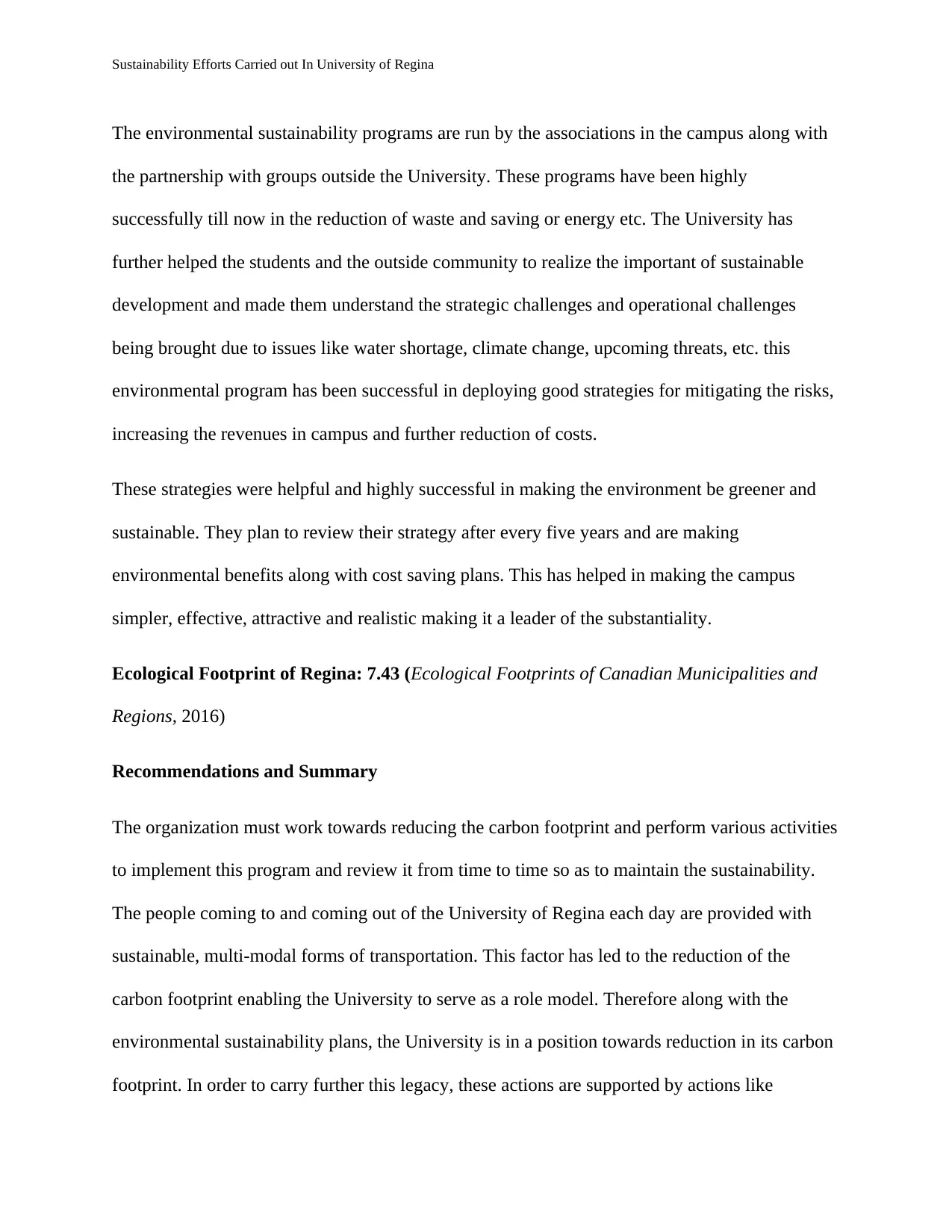
Sustainability Efforts Carried out In University of Regina
The environmental sustainability programs are run by the associations in the campus along with
the partnership with groups outside the University. These programs have been highly
successfully till now in the reduction of waste and saving or energy etc. The University has
further helped the students and the outside community to realize the important of sustainable
development and made them understand the strategic challenges and operational challenges
being brought due to issues like water shortage, climate change, upcoming threats, etc. this
environmental program has been successful in deploying good strategies for mitigating the risks,
increasing the revenues in campus and further reduction of costs.
These strategies were helpful and highly successful in making the environment be greener and
sustainable. They plan to review their strategy after every five years and are making
environmental benefits along with cost saving plans. This has helped in making the campus
simpler, effective, attractive and realistic making it a leader of the substantiality.
Ecological Footprint of Regina: 7.43 (Ecological Footprints of Canadian Municipalities and
Regions, 2016)
Recommendations and Summary
The organization must work towards reducing the carbon footprint and perform various activities
to implement this program and review it from time to time so as to maintain the sustainability.
The people coming to and coming out of the University of Regina each day are provided with
sustainable, multi-modal forms of transportation. This factor has led to the reduction of the
carbon footprint enabling the University to serve as a role model. Therefore along with the
environmental sustainability plans, the University is in a position towards reduction in its carbon
footprint. In order to carry further this legacy, these actions are supported by actions like
The environmental sustainability programs are run by the associations in the campus along with
the partnership with groups outside the University. These programs have been highly
successfully till now in the reduction of waste and saving or energy etc. The University has
further helped the students and the outside community to realize the important of sustainable
development and made them understand the strategic challenges and operational challenges
being brought due to issues like water shortage, climate change, upcoming threats, etc. this
environmental program has been successful in deploying good strategies for mitigating the risks,
increasing the revenues in campus and further reduction of costs.
These strategies were helpful and highly successful in making the environment be greener and
sustainable. They plan to review their strategy after every five years and are making
environmental benefits along with cost saving plans. This has helped in making the campus
simpler, effective, attractive and realistic making it a leader of the substantiality.
Ecological Footprint of Regina: 7.43 (Ecological Footprints of Canadian Municipalities and
Regions, 2016)
Recommendations and Summary
The organization must work towards reducing the carbon footprint and perform various activities
to implement this program and review it from time to time so as to maintain the sustainability.
The people coming to and coming out of the University of Regina each day are provided with
sustainable, multi-modal forms of transportation. This factor has led to the reduction of the
carbon footprint enabling the University to serve as a role model. Therefore along with the
environmental sustainability plans, the University is in a position towards reduction in its carbon
footprint. In order to carry further this legacy, these actions are supported by actions like
Paraphrase This Document
Need a fresh take? Get an instant paraphrase of this document with our AI Paraphraser
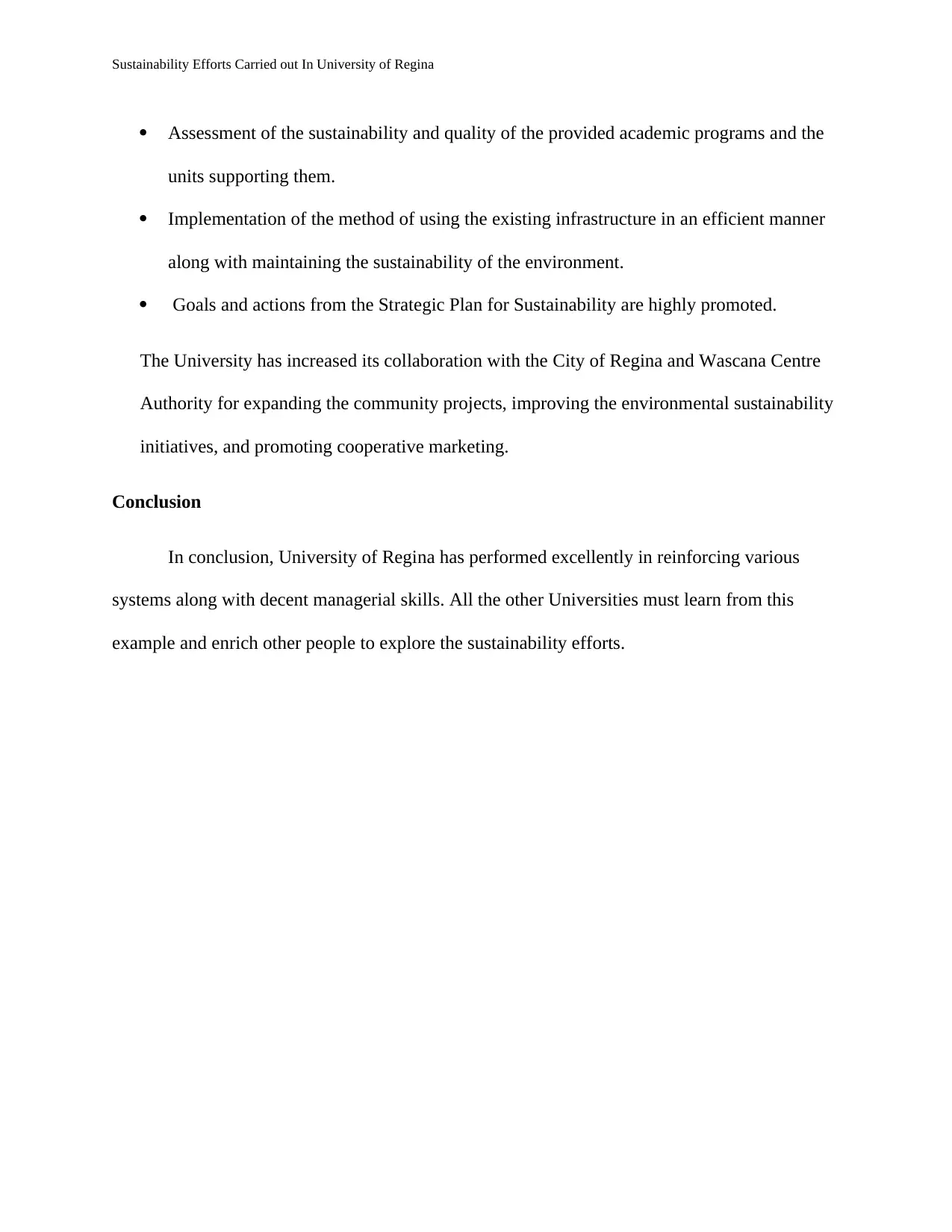
Sustainability Efforts Carried out In University of Regina
Assessment of the sustainability and quality of the provided academic programs and the
units supporting them.
Implementation of the method of using the existing infrastructure in an efficient manner
along with maintaining the sustainability of the environment.
Goals and actions from the Strategic Plan for Sustainability are highly promoted.
The University has increased its collaboration with the City of Regina and Wascana Centre
Authority for expanding the community projects, improving the environmental sustainability
initiatives, and promoting cooperative marketing.
Conclusion
In conclusion, University of Regina has performed excellently in reinforcing various
systems along with decent managerial skills. All the other Universities must learn from this
example and enrich other people to explore the sustainability efforts.
Assessment of the sustainability and quality of the provided academic programs and the
units supporting them.
Implementation of the method of using the existing infrastructure in an efficient manner
along with maintaining the sustainability of the environment.
Goals and actions from the Strategic Plan for Sustainability are highly promoted.
The University has increased its collaboration with the City of Regina and Wascana Centre
Authority for expanding the community projects, improving the environmental sustainability
initiatives, and promoting cooperative marketing.
Conclusion
In conclusion, University of Regina has performed excellently in reinforcing various
systems along with decent managerial skills. All the other Universities must learn from this
example and enrich other people to explore the sustainability efforts.
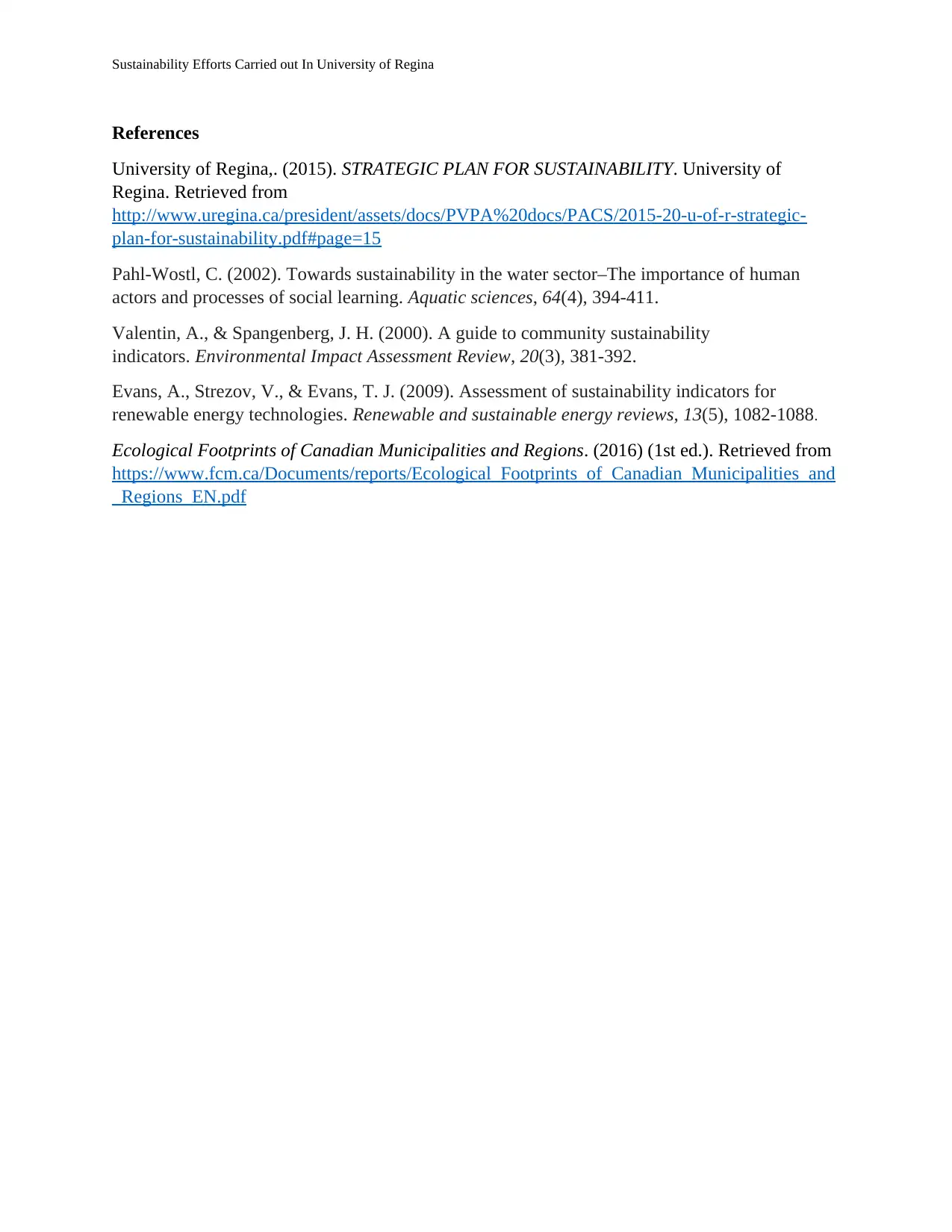
Sustainability Efforts Carried out In University of Regina
References
University of Regina,. (2015). STRATEGIC PLAN FOR SUSTAINABILITY. University of
Regina. Retrieved from
http://www.uregina.ca/president/assets/docs/PVPA%20docs/PACS/2015-20-u-of-r-strategic-
plan-for-sustainability.pdf#page=15
Pahl-Wostl, C. (2002). Towards sustainability in the water sector–The importance of human
actors and processes of social learning. Aquatic sciences, 64(4), 394-411.
Valentin, A., & Spangenberg, J. H. (2000). A guide to community sustainability
indicators. Environmental Impact Assessment Review, 20(3), 381-392.
Evans, A., Strezov, V., & Evans, T. J. (2009). Assessment of sustainability indicators for
renewable energy technologies. Renewable and sustainable energy reviews, 13(5), 1082-1088.
Ecological Footprints of Canadian Municipalities and Regions. (2016) (1st ed.). Retrieved from
https://www.fcm.ca/Documents/reports/Ecological_Footprints_of_Canadian_Municipalities_and
_Regions_EN.pdf
References
University of Regina,. (2015). STRATEGIC PLAN FOR SUSTAINABILITY. University of
Regina. Retrieved from
http://www.uregina.ca/president/assets/docs/PVPA%20docs/PACS/2015-20-u-of-r-strategic-
plan-for-sustainability.pdf#page=15
Pahl-Wostl, C. (2002). Towards sustainability in the water sector–The importance of human
actors and processes of social learning. Aquatic sciences, 64(4), 394-411.
Valentin, A., & Spangenberg, J. H. (2000). A guide to community sustainability
indicators. Environmental Impact Assessment Review, 20(3), 381-392.
Evans, A., Strezov, V., & Evans, T. J. (2009). Assessment of sustainability indicators for
renewable energy technologies. Renewable and sustainable energy reviews, 13(5), 1082-1088.
Ecological Footprints of Canadian Municipalities and Regions. (2016) (1st ed.). Retrieved from
https://www.fcm.ca/Documents/reports/Ecological_Footprints_of_Canadian_Municipalities_and
_Regions_EN.pdf
⊘ This is a preview!⊘
Do you want full access?
Subscribe today to unlock all pages.

Trusted by 1+ million students worldwide
1 out of 6
Related Documents
Your All-in-One AI-Powered Toolkit for Academic Success.
+13062052269
info@desklib.com
Available 24*7 on WhatsApp / Email
![[object Object]](/_next/static/media/star-bottom.7253800d.svg)
Unlock your academic potential
Copyright © 2020–2025 A2Z Services. All Rights Reserved. Developed and managed by ZUCOL.





